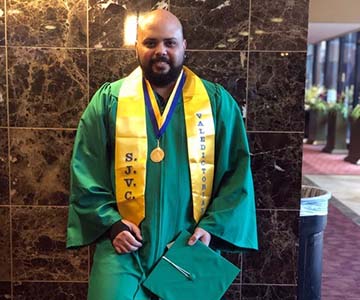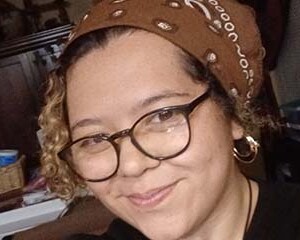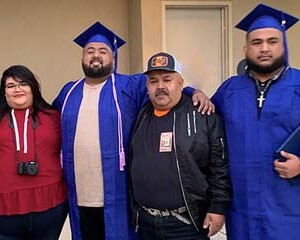Disabled military veteran chooses Medical Office Administration program for a career that will accommodate physical restrictions
 Ramon De Jesus planned to spend his life as crew chief for aircraft maintenance in the U.S. Air Force. For eight years he enjoyed his work, military life and assignments that took him to high-alert stations where he worked on advance technology spy planes. He provided a good life for his wife Betty and their two young daughters Enola and Esmeralda.
Ramon De Jesus planned to spend his life as crew chief for aircraft maintenance in the U.S. Air Force. For eight years he enjoyed his work, military life and assignments that took him to high-alert stations where he worked on advance technology spy planes. He provided a good life for his wife Betty and their two young daughters Enola and Esmeralda.
But serious back-to-back injuries incurred on the job resulted in a medical discharge that forced him to give up the secure life he loved for an unknown future. “It was a shock to the system and life-changing,” he says. “I had to scramble to decide what I was going to do to replace my military career goal.”
His injuries wouldn’t permit him to do a lot of standing or physically intense work, so he couldn’t consider the correctional officer opportunities many military veterans easily transitioned into. “I had to find something that was more of an office environment,” says Ramon.
His doctor recommended an office job, and a medical office position jumped out at him right away. “Even as a child, I was always drawn to the medical field,” he remembers. Years earlier, Ramon spent a year in a biology program and loved it. “I’ve always been a fan of science and am fascinated that there is always something new to learn.”
Ramon started online research and found San Joaquin Valley College right away. With Betty’s complete support, he enrolled in the Medical Office Administration program on the Madera campus. “She was very supportive. I wouldn’t be able to get through it without her. And, the girls knew what I was doing. They’re pretty smart, and I like to set a good example.”
At 32 years old, Ramon found himself to be a full-time student and on track toward a completely new career.
Ramon had been both student and teacher many times before, so he knew what he needed to be successful in this endeavor. He was appreciative of the many positives the Medical Office Administration program provided.
“I needed to get into a job pretty quickly, so the time frame was pretty great,” he says. “Also, the courses were spread out well, and I didn’t feel rushed, even though there was a lot of material. You can get overwhelmed easily, but I didn’t get that feeling at all. You have enough time each week to learn exactly what you need to.”
He admits that being a student later in life was a little difficult. “Getting back into studying, scheduling the time and trying to memorize all the medical terms was an adjustment, but I ended up getting the hang of it.”
The classroom dynamic wasn’t quite what he expected at first. “There were a lot of shy people when I first started, and nobody really talked much,” he remembers. “I’m not a shy guy and I’m usually the class clown, so I’m going to crack a few jokes in class or ask a silly question.” Everybody got more comfortable as they interacted. “As the days went on, we all became pretty close friends. That’s what did it for me.”
Medical Office Administration instructors played a big part in Ramon’s satisfaction, too. “Teachers were great, some of the best I’ve ever had. I asked a lot of questions, that’s how I learn more. I disturbed the class a lot, but they went with it and adapted to my particular learning needs and techniques.”
Ramon’s style of learning may have helped his fellow classmates, too. “It (interaction) made me get more involved with the other students,” he says. “The majority of them were a lot younger than me.” He was always ready with some life advice, especially when it comes to career education.
“Do it, as long as you can,” he encourages. “It’s not wasted time to learn a new background, and it might serve you even if you’re in a different career field. You never know when you might need something else to fall back on.”
Ramon knows from his own very recent experience of career replacement that a back-up plan can be pulled into full action. “If things don’t go according to plan, there’s always other ways to achieve your goals. That’s a philosophy I’ve learned in the military. There’s more than one way to fix a problem.”
Ramon completed his Medical Office Administration program last October and went to work for Cardiovascular Consultants soon after as an appointment scheduler. “Working in a cardiologist’s office, I meet interesting people and doctors and think it was a great step to join the medical field.”
He is far from finished, however, in his new career direction. Ramon is now enrolled elsewhere and in the process of earning his Bachelor’s degree in business administration in hopes of becoming the manager in a billing department.
The eyes of many loved ones are watching his progress. “I’m trying to be a good example for my girls,” says Ramon. “Showing them that if you get injured, you can still come back and make something better of your life, even if things don’t go according to plan.”
Ramon has a strong example to follow. “When it comes to his kids, there’s nothing my dad (Ramon) won’t do,” he says. “Not just words, but action.”
When Ramon Sr. comes from Puerto Rico to visit, Ramon feels his father’s pride. “He says it all the time, that he’s so proud of me. He is a vet as well and once told me, ‘I wasn’t expecting you to make it past basic training,’” Ramon laughs. “Since then, he’s seen what I’ve done.”
Ramon looks around him now and is pleased with the new life he was forced to create. His motivation is clear. “That’s what drives me to do the things to make them proud. I strive to make my dad proud, and I strive to make by daughters and wife proud, as best as I can.”
Ramon has enough discipline, vision and strength to inspire anyone who needs to redesign his or her career goals.
You might also like
More stories about
Request Information
All fields using an asterik (*) are required.


